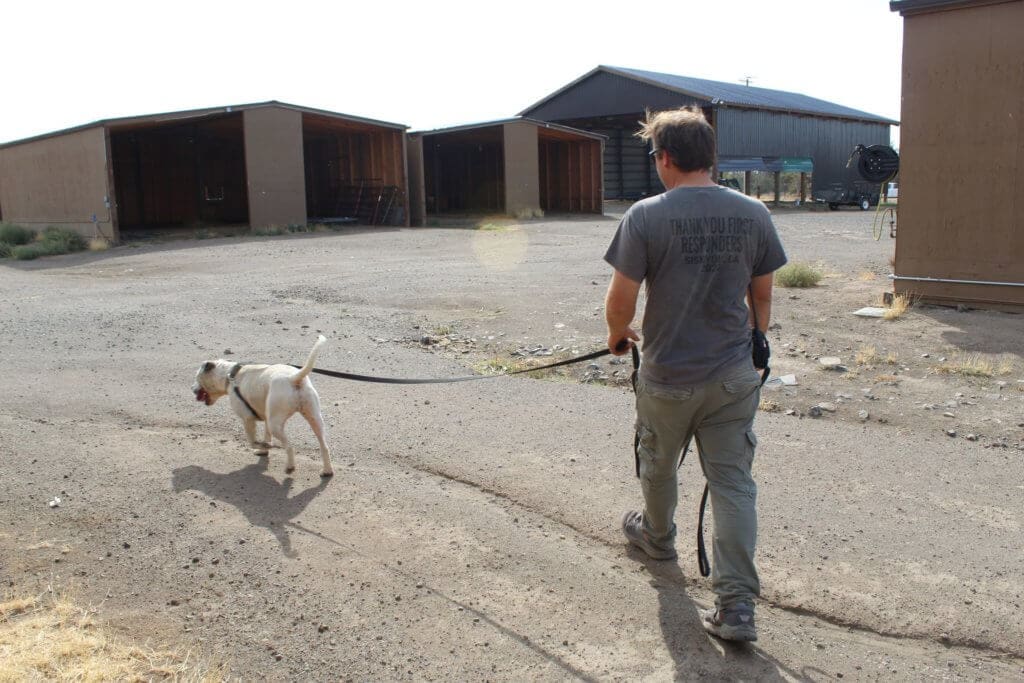 September 19 through 25 is Deaf Pet Awareness Week. Coming as it does on the heels of Adopt a less Adoptable Pet Week earlier this month, I feel inspired to tell you about Rodeo, a young, deaf pit bull mix who would love to find a forever home. Would you give a deaf rescue dog a chance?
September 19 through 25 is Deaf Pet Awareness Week. Coming as it does on the heels of Adopt a less Adoptable Pet Week earlier this month, I feel inspired to tell you about Rodeo, a young, deaf pit bull mix who would love to find a forever home. Would you give a deaf rescue dog a chance?
Rodeo is an outgoing, 60 lb dog. His short white coat is speckled with light grey. At roughly three and a half years old, he is maturing, but he’s still a feisty young dog who loves attention.
Rodeo, the deaf rescue dog, needs adopters to see beyond his ears and his fears
He came to Rescue Ranch from Mendocino Coast Humane Society in Fort Bragg a year and half ago, at the instigation of Rescue Ranch Dog handler and Sanctuary Manager Austin Browder. Unfortunately, despite being a very good albeit energetic boy, he has so far elicited little interest.
He doesn’t like feeling cornered and has learned that when he barks, people step away from his kennel. He might get more space with this tactic, but it doesn’t necessarily endear him to potential adopters. According to Austin, Rodeo’s energetic barrier response is actually fear-based. He has found that Rodeo does much better out in the open.
While it is a great facility, the high energy and close quarters of the Adoption Center are less than ideal for long-term residents like Rodeo. After a year and a half, and with no adopters in sight, he was recently moved out to the sanctuary. There, the dogs are a less confined and are able to relax more easily in a more leisurely environment.
After just a few days, Austin reports that Rodeo is already doing great. He’s calmer and appears much happier. Watching them together, it is clear that they have great rapport and that Rodeo is benefiting from the extra attention.
Communication is a major challenge for a deaf dog
I asked Austin about working with a deaf dog and what Rodeo’s biggest challenges are.
He replied that Rodeo relies on his sight to recognize people and that he is most reactive when he’s startled. Unlike a hearing dog, if he doesn’t see you or if he’s sleeping, Rodeo doesn’t know you’re there until you suddenly materialize in front of him. Unsurprisingly, he might react by jumping up or vocalizing.
Because he relies so heavily on his eyesight, Rodeo is even more sensitive to body language and facial expression than a hearing dog. It’s the only way he can gauge what’s going on and what his handler expects from him.
Austin says that Rodeo really enjoys agility training and responds well to hand signals. He knows heal, stop, sit, come here. He also understands that a thumbs-up means, “good boy!” or “Yes, that’s right!” and a wagging index finger means, “No” or “Stop that!” He’ll also jump up on any surface that Austin points to.
The ideal adoption scenario for Rodeo, the deaf rescue dog
Rodeo is still up for adoption if we can find the right match, which ideally would include:
- An adopter who wants to help a special needs dog and will spend extra time learning how to communicate with him.
- Space. Rodeo needs a well-fenced yard. The good news is that he’s not an escape artist and doesn’t appear interested in digging either. A kennel is fine for short term confinement, but he really needs to spend a lot of time in a safe, open space.
- A Training collar. Being able to recall Rodeo is critical for his own safety. The adopter should be willing to use an electric or vibrating collar to get Rodeo’s attention from a distance or when he can’t see his handler.
- No young children. He would do best in a home with adults only.
- Probably no cats. Other dogs don’t seem to be much of an issue, but we don’t know Rodeo’s attitude towards cats. He might be fine but he might not. You could use the training collar to try to teach him not to give chase, but a cat-free environment would be the safest bet.
- Outdoor living. Rodeo will need to be mostly an outside dog, at least when he’s unsupervised. A training collar might also help here, but Rodeo really loves taking the stuffing out of the sofa.
- Leash training. If his adopter wants to go on walks and hikes, Rodeo will need additional leash training. Of course, he does best off-leash. That’s where the training collar becomes even more necessary.
This boy has spent most of his life as a rescue dog, he is way past due for a loving home of his own. Can you give him the attention he needs and provide a safe, loving environment where he can thrive? If you can, he will be a wonderful companion.

Rodeo is available for “meet and greets” at the sanctuary by appointment. Please call rescue Ranch for more information at 530-842-0829.









